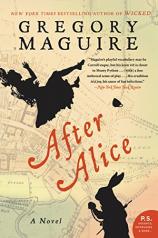Reading Group Guide
Discussion Questions
After Alice

1. Had you read ALICE’S ADVENTURES IN WONDERLAND by Lewis Carroll before reading Gregory Maguire’s AFTER ALICE? If not, are you curious to go back and read (or reread) it?
2. Had you read any of the author’s earlier revisionist fairy tales, such as MIRROR MIRROR or CONFESSIONS OF AN UGLY STEPSISTER? Why do you think readers find these revamped classic stories so appealing?
3. Ada is said to have “lived with a sense of disappointment and failure, thanks to her misshapen form, suffered from a flat dream-life, one that seemed poorly differentiated from waking hours.” How much do you think Ada’s brace affected her personality? Once she fell down the rabbit hole, why do you think this was one of the first things she shed? How is she different without it?
4. In Chapter 14, we learn that “a story in a book has its own intentions, even if unknowable to the virgin reader, who just lollops along at her own pace regardless of the author’s strategies, and gets where she will.” What are the intentions of AFTER ALICE? Did it differ from your own?
5. After falling down the rabbit hole, one obstacle after another presents itself as Ada searches for her friend, Alice. A bird tells Ada, “All who descend meet reproach.” How so?
6. Ada’s story alternates with that of Lydia, Alice’s sister, who is charged with finding the two young girls. Did you favor reading one section over another?
7. How is Ada different from her friend, Alice? How is Lydia similar to her sister?
8. What do you think is the significance of Mr. Clowd having such a prominent visitor as Charles Darwin?
9. What was the purpose of Josiah Winter and his young charge, Siam, in the story? Were you surprised that Lydia felt jealous that Mr. Winter might pay more attention to the hapless governess, Miss Armstrong? Do you think there was something else behind her cruel treatment of the harried governess? What do you think of Miss Armstrong’s opinion of Ada’s disability?
10. Gregory Maguire’s earlier book WICKED, a fresh take on THE WONDERFUL WIZARD OF OZ, was adapted into one of the most successful Broadway musicals of all time. How do you think AFTER ALICE would fare as a musical?
11. In Wonderland, Ada is aghast at the Queen’s careless uprooting of the roses: “My,” said Ada, laying the dead rose upon the peaty moss. “Life is a very cheap thing here.” And the aforementioned blossom replies, “Cheap and dear all at once,” said the Rose from her grave. “That’s the thing. You’ll figure it out sooner than later.” How does this sentiment apply to Ada’s and Alice’s life back in Oxford?
12. Miss Armstrong and Mr. Clowd have a discussion of mortality over tea, and the governess highlights a quote from Emerson on the nature of faith and grief, and how the strength of one’s beliefs should shore them against any loss they should encounter. Mr. Clowd counters with “Perhaps Emerson’s comment is wrong. Perhaps we are meant and made to shift our beliefs. If it is a choice between being consistent or being willfully blind.” Do you agree?
13. After finally finding Alice, Ada decides to follow the White Queen’s advice and “go through the ceiling” to make her ascent back home: “She felt a sudden rage. The ascent of the human creature --- one has to fight to be born, after all. She bashed against the glass with every ounce of her might. She would break through, she would. So she did, being a child with more force of intention that she’d previously allowed herself to acknowledge.” What do you think the author is saying here with this mode of returning to the real world?
14. Were you surprised that Ada did not encounter Alice until almost the very end?
15. At the end of the novel, Darwin tells Mr. Winter, “If separate species develop skills that help them survive, and if those attributes are favored which best benefit the individual and its native population, to what possible end might we suppose has arisen, Mr. Winter, that particular capacity of the human being known as the imagination?” What did you think Darwin meant with this statement?








